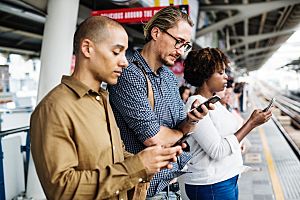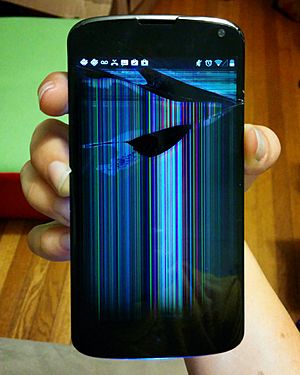Nomophobia facts for kids
Nomophobia is a short way of saying "no mobile phone phobia." It describes the fear or worry you might feel when you don't have your mobile phone, or when it's not working. This could be because the battery is dead, you have no signal, or you've lost it. Experts sometimes see it as a sign of using digital devices too much.
Contents
Understanding Nomophobia
More and more people have been using mobile phones since 2005, especially in countries in Europe and Asia. When mobile phones connect to the internet, it can sometimes lead to nomophobia. People might use their phones a lot to feel better if they are anxious, have low self-esteem, or feel emotionally unstable. Some use phones to find comfort in their relationships.
Even though nomophobia isn't officially listed in the Diagnostic and Statistical Manual of Mental Disorders (DSM-5), some experts think it should be. They see it as a "specific phobia," which is a strong, unreasonable fear of something.
In 2008, the UK Post Office asked a group called YouGov to study how mobile phone users felt. This is when the term "no-mobile-phone phobia" was first used. The study found that about 53% of mobile phone users in Britain felt anxious if they lost their phone, ran out of battery, or had no network. Out of 2,163 people, more men (58%) than women (47%) had this fear. Another 9% felt stressed when their phones were off. Most people (55%) said they felt anxious because they wanted to stay in touch with friends or family. The study even said that the stress from nomophobia was similar to feeling nervous before a wedding or a trip to the dentist!
It's interesting that more than half of people with nomophobia never turn off their mobile phones.
Why Do People Experience Nomophobia?
As technology changes, new challenges appear every day. This includes new types of fears, sometimes called "techno-phobias." Mobile phones have become a huge part of most societies since they first came out in 1983.

Surveys show that young adults and teenagers are more likely to have nomophobia. One survey found that 77% of teens felt worried without their phones. This was higher than any other age group. Some things that might make a person more likely to have this fear include:
- Thinking negatively about themselves.
- Being younger.
- Having low self-esteem.
- Being very outgoing or very shy.
- Acting on impulse.
- Always looking for new experiences.
Among students, using cell phones a lot has been linked to lower grades and more anxiety. This can make them less happy with their lives. Lower grades might happen because phones take up time and focus needed for studying or classes. More anxiety could come from feeling pressured to always be online and connected to social media. This can also take away chances for quiet time, which helps reduce daily stress.
People use mobile phones to connect with friends and family. They can get support and comfort online. Phones are powerful tools for our emotional lives.
How Mobile Phones Affect Happiness
Research suggests that using mobile phones can be linked to less satisfaction with life. While phones make life easier, they can also cause stress. Many people rely on phones for work and daily life because of high work pressure, constant communication, and fast information updates. If a phone dies or stops getting notifications, some people feel anxious, irritable, or depressed. Studies show that more mobile phone use is often linked to less happiness, mindfulness, and life satisfaction.
In Australia, a study looked at 946 young people aged 15 to 24. It explored how often they used their phones and how much they felt connected to them. The study found that while there were no serious problems, many showed signs of being very attached to their phones. Those who used their phones a lot were more likely to increase their use when they got positive feedback from others. Teenagers and young adults might become more dependent on phones because they are still figuring out who they are and looking for approval from others.
People with panic disorders or anxiety disorders are also more likely to depend on their mobile phones. A study in Brazil compared people with panic disorders to a healthy group. About 44% of those with panic disorder felt "secure" with their phones. The study found that 68% of all participants showed some mobile phone dependence. However, people with panic disorder felt much more emotional and dependent on their phones when they couldn't access them.
Signs and Feelings of Nomophobia
Nomophobia happens when someone feels very anxious because they can't use their mobile phone. This "over-connection syndrome" can make people spend less time talking face-to-face. This can affect their social and family life. "Techno-stress" is another term for someone who avoids real-life interactions by staying isolated, which can lead to mood problems like depression.
Anxiety can be triggered by losing a phone, having no signal, or a dead battery. Some signs of nomophobia include:
- Using the phone without thinking.
- Using it to avoid talking to people in person.
- Always having one or more devices with internet access.
- Always carrying a charger.
- Feeling anxious just thinking about losing the phone.
- Reducing sleep because of phone use.
- Checking the phone screen often to avoid missing messages or calls (this is sometimes called "ringxiety").
- Having physical problems like sore elbows, hands, or necks from using the phone too much.
- Getting into debt from using too much data or having many devices.
People with nomophobia might have strong, unreasonable reactions in places where phone use is not allowed, like airports or hospitals. Using a phone too much for daily tasks, like buying things, can also cause money problems. If they don't get calls or messages, they might feel upset or depressed. Wanting to sleep with a phone nearby is another sign of attachment. Being able to communicate through a phone gives these individuals a sense of peace and safety.
Nomophobia can also be a sign of other problems. People with underlying social anxiety might feel nervous, anxious, sweaty, or shaky when they can't use their devices. They might always keep their phones close or go back home to get a forgotten phone.
This behavior can make social anxiety worse, as people rely more on online communication to reduce stress. Those with panic disorders might also show nomophobia. They might feel rejected, lonely, insecure, or have low self-esteem if they don't get many calls or messages. They might feel more anxious and depressed about their phone use, even if they don't make many calls themselves.
Nomophobia can also make people use their phones in risky ways, like:
- Never turning the device off.
- Using it where it's forbidden (like in class).
- Using it dangerously (like while driving).
The fear of not being able to get information on their phone seems to be the biggest reason for using it illegally while driving.
Common Feelings and Physical Signs
- Anxiety
- Changes in breathing
- Trembling
- Sweating
- Agitation
- Feeling confused
- Fast heartbeat
Emotional Signs
- Depression
- Panic
- Fear
- Dependence
- Feeling rejected
- Low self-esteem
- Loneliness
Treatments for Nomophobia
Since nomophobia is a fairly new idea, there aren't many proven treatments yet. However, some promising approaches include:
- Cognitive-behavioral psychotherapy (CBT): This therapy helps people change their thinking and behavior patterns. It aims to help them become more independent from technology.
- Reality Approach: This therapy encourages patients to focus on behaviors that are not related to their cell phones.
In very serious cases, doctors might use medications like certain antidepressants. But it's important to know that these medicines are usually for treating other mental health issues, like social anxiety disorder, not nomophobia directly. It's often more helpful to find and treat any other mental health problems that might be causing the nomophobia.
Even though it's new, there are surveys and tests that can help identify nomophobia, like the "Questionnaire of Dependence of Mobile Phone/Test of Mobile Phone Dependence (QDMP/TMPD)."
See also
 In Spanish: Nomofobia para niños
In Spanish: Nomofobia para niños
- Mobile phone overuse
- Screen time
- Digital media use and mental health
- Autophobia, fear of being alone
- Internet addiction disorder
- Problematic smartphone use
- Technostress
- Telephone phobia
- De Quervain syndrome


